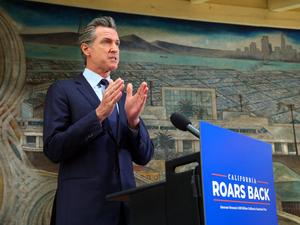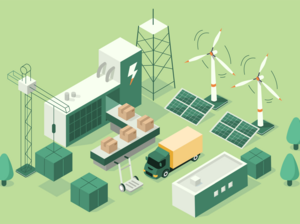
The California Hydrogen Business Council is presenting its first California Hydrogen Leadership Summit in Sacramento this winter to highlight to policymakers hydrogen’s role in the future of decarbonization in California.
“There are pressing issues at hand. We are not going to meet our policy goals without hydrogen,” Sara Fitzsimon Nelson, policy director with the council, told the Business Journal.
The state has set goals to decarbonize its economy and reduce its greenhouse gas emissions to 40% below 1990 levels by 2030.
Some of that decline will be driven from converting electric generation to renewable sources and from transitioning transportation to non-petroleum fuels.
Hydrogen can have an important role in both of those sectors, Fitzsimon Nelson said, but it needs support to scale the industry.
“Our concern is that there is not a carve-out for hydrogen” in the state's zero-carbon plans, said Fitzsimon Nelson, who is based in Sacramento.
The California Hydrogen Business Council is a trade group of 130 organizations, including power companies, automakers and air quality management districts.
The business council has held seven California Hydrogen and Fuel Cell summits annually, the last being in March of 2020 at the California Environmental Protection Agency headquarters in Sacramento.
Those were more industry-facing gatherings, while the new California Hydrogen Leadership Summit will be a policy-facing event for lawmakers and agencies, along with the industry and other interested parties, Fitzsimon Nelson said. The group is anticipating more than 300 attendees.
If California supports growth of the hydrogen industry, hydrogen can be generated from excess solar power, and then used to power the grid when the sun isn’t shining, she said. It can also be used to clean up emissions at ports using hydrogen fuel cells rather than gas or diesel fuel.
And hydrogen-sourced renewable diesel fuel can be used to make jet fuel, for which there currently aren’t viable electric alternatives.
“There are a lot of opportunities for transportation fuel, especially in aviation,” Fitzsimon Nelson said.
California already has the most installed hydrogen fuel cell stations, where people can fill their fuel-cell cars with hydrogen in about the same time it takes to fill with gasoline. That ability to refuel quickly also makes hydrogen fuel cells a potential solution for long-distance trucking, where refueling quickly is a concern, she said.
The in-person summit will be Jan. 31 and Feb. 1, at the Sheraton Grand Sacramento Hotel.







